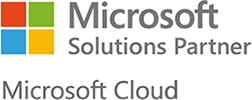Picture this: you’re running a thriving small business, juggling client calls, day-to-day operations, team meetings and everything else in between. If you had the time, you might think that cloud computing is some sort of enterprise-level resource that only big corporations with sprawling IT departments can make use of. You’d be wrong.
And, we’d bet dollars to doughnuts (see what we did there?), you’re already using the cloud in more ways than you realise.
Busting the cloud myth
OK here is Microsoft’s definition of the cloud (small C please). “The cloud is a vast online storage space where people and businesses store their files and applications, accessible from anywhere with an internet connection. The cloud also offers services, such as computing power, databases, networking, and software applications.”
You can find this really useful overview of what the cloud is here.
Microsoft also has this helpful distinction between the cloud and the internet: “The cloud and the internet are different technologies that work together. The internet is the underlying infrastructure that connects devices globally, and the cloud uses this infrastructure to provide services and resources.”
The modern cloud is accessible

And, the days when cloud services meant expensive, high-maintenance systems are also long gone. Most modern cloud platforms and Software as a Service (SaaS) offer pay-as-you-go models that enables you to invest only in what you need.
Whether you’re a start-up or a well-established local business, the cloud delivers the same cutting-edge technology without the hefty price tag. It’s not about jumping on the latest trend – it’s about getting the most out of a resource that adapts to your specific needs and grows with your business.
So, from that perspective you can the cloud has changed the game for small businesses. Less legacy set ups, more agility in decision-making, and simpler systems to move and replicate in the cloud, mean that is far easier for a small business to take advantage of what the cloud has to offer – and we’re here to help you do that.
The perks of the cloud: choice, flexibility, security and the price tag (cha-ching)

OK so let’s start with the cha-ching, cha-ching. The price tag. The cloud frees your business from the cost of having to have physical servers and infrastructure to store all your company data and software programmes etc – that’s a big cost saving right there.
Not only do you not need to buy the equipment and the licences, but you don’t have to pay someone to look after it all for you or pay to update or upgrade when you run out of space or it becomes out of date.
The other price tag benefit is the cost of the resources that you use in the cloud. Free, “freemium”, pay-as-you-go and cancel any time models keep the hit on your bottom line to a minimum. And rather than having a big up-front capital expenditure (for the server and the software licence to go on it) come out of your budget, you can turn it in to a predictable operational expense that is much easier to budget for and manage.
Flexibility and choice of cloud solutions

And there is sooooo much choice when it comes to cloud services and resources. These days you can barely open your browser, email, LinkedIn or Facebook etc without coming across a new cloud service or application. It’s literally like trying to swing a cat and not hitting something. (Not that we would ever condone such behaviour – poor kitty.)
But take the analogy and you get what we mean. If your business needs a service or a server – the cloud is the place to look. Think about it, you’re probably using lots of cloud resources already, without actually thinking about it.
Do you have Microsoft 365, Microsoft Teams? Or perhaps you are a Google suite fan? Is your accounting package something you access through your browser? What about your banking services? Do you use a Customer Relationship Management tool (CRM), a planning app or perhaps you like to send out newsletters to your customers or even surveys. There’s a cloud tool for that. Use any of these things and you are using the cloud. And this is also where the security offered by the cloud comes in.
How secure is the cloud for your business?

Yes we’ve all read about the bank systems breaches, the data leaks and thefts, the software code glitches, and lots of other insidious news items about the cloud, what’s in it and how people want to get at it. But these incidents aside, the cloud is a pretty secure place to put your business data and information. It’s a pretty safe place to do business. And run one.
Cloud providers – whether that’s a resource provider like Amazon AWS or a software provider like Monday.com or Xero – are hell bent on making their services as secure as possible. Advanced encryption, multi-factor authentication, and continuous monitoring and defensive security protocols are standard features designed to safeguard your information against cyber and other threats.
They also typically have robust disaster recovery processes and systems, meaning your data is regularly backed up and stored across multiple locations. In the event of hardware failure or a cyber incident, you can rest assured that your critical information is safe and recoverable. Of course, you can always add to the security, and peace of mind, by ensuring you have a business continuity plan in place.
Ready or not, here it comes
So we’re agreed the cloud is a good thing, particularly for your small business. It’s not a big scary place to be because you are already there. And there is probably much more you can get out of using the cloud for your business.
Plainly put, it makes your life easier when you use the cloud, and when you partner with an experienced IT support company to do so. It also saves you money, gives you choice, flexibility and security. There are lots of other benefits to using the cloud and we’d like to help you discover them.



